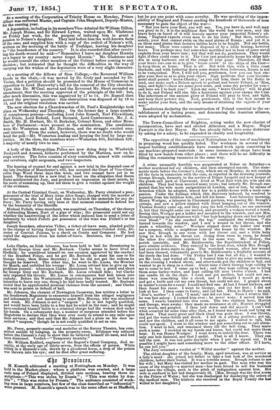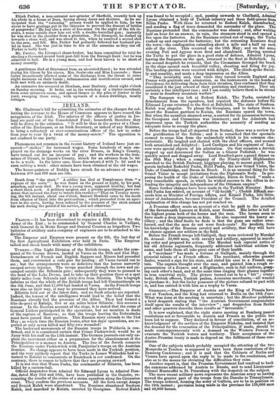C4t Vriluiurro.
11, Kossuth addressed a meeting at Nottingham on Monday. It was held in the Market-place ; where a platform was erected, and a large rude map of Poland displayed, divided into sections, bearing these in- scnptions—" This was stolen by Russia " ; "This was stolen by Aus- !na " ; "This was stolen by Prussia." The audience consisted of work- ing men in large numbers, but few of the class described as "influential" were present. M. Kossuth's speech was to the same effect as at Sheffield, but he put one point with some novelty. He was speaking of the impos- sibility of England and France sending the hundreds of thousands of men necessary to gain the object of the war— But you have your fleet, you will say. Yes, you have it, and well may you glory in it ; it is the mightiest fleet the world has ever seen and the brave boys on board of it will bravely answer your immortal Nelson's ad- dress, 'England expects every man to do his .duty.' But then, unfortu- nately, your fleet cannot swim on the sand plains of Russia; and yet it is on these sand plains that decisive battles have to be fought. Not one battle, but many. These wars cannot be disposed of by a little boxing, however brave. You perhaps may feel somewhat mortified not to hear of some naval exploits from your brave tars ; but that will not do, gentlemen. They would fight if they could come to it. The Czar just prudently keeps his ships hid- den in snug harbours out of the range of your guns. Therefore, all that your brave tars can do is to give house arrest' to the ships of the Czar— to keep them at home. That is all. But with this, with a little coast blockade, and with battering down some stones from fortresses, Russia is not to be vanquished. Now, I will tell you, gentlemen, how you can best em- ploy your fleet so as to gain your object. Sign petitions that your Govern- ment shall permit brave Charley,' as you call him' there in the Baltic to land, and make such a Nelson speech to gallant and heroic Poland, as 'Rise, boys, and fight !—here are some good arms, and some dry powder for you— and here am I to back you!' Upon my soul, brave Chancy' will be glad to do it, and Poland will rise like a hurricane against your enemy the Czar. The inheritors of the ancient glory of Poland will pray to God, and fight, and keep their powder dry. Now, gentlemen, this is the best means to make useful your fleet, and the only means of attaining the oqjects of your war."
Resolutions declaring the reconstruction of Poland essential to the es- tablishment of a lasting peace, and denouncing the Austrian alliance, were adopted by acclamation.
The Town-Councillors of Brighton, acting under the new charter of incorporation have met and elected Aldermen and a Mayor. Major Fawcett is the first Mayor. He has already fallen into some disfavour by asking for a salary, to be expended in charity and hospitality.
The opposition of the carpenters of Nottingham to the use of machinery in preparing wood has quickly failed. The workmen in several of the largest building establishments have resumed work upon consenting to use machine-prepared materials : in some instances the shops have been filled by new hands from other places ; and there will be no difficulty in filling the remaining vacancies in the same way.
A crime unusually horrible was perpetrated at Esher on Saturday—a mother murdered her six children, and then attempted suicide. The state- ments made before the Coroner's Jury, which sat on Monday, do not contain all the facts in connexion with the case, as reported in the morning journals. George Brough, formerly in the service of Prince Leopold and now keeper of the ponds and park at Claremont, lived at West End with his wife and six children. They had been married many years; but latterly Mr. Brough sus- pected that his wife made assignations in London, and at last, by means of detection which he adopted, traced her to a public-house with a mate com- panion. Under the feelings which this discovery induced, he resolved to separate from his faithless wife, and left his home. Last Saturday morning, Henry Woolgar, a labourer in Claremont garden; was passing Mr. Brough 's cottage, and saw a pillow stained with blood hanging out of the window. Thomas Beasley came up, and they rang the bell violently ; no one answered it, but they thought some one moved, and presently a woman waved a towel. Seeing this, Woolgar got a ladder and mounted to the window, and saw Mrs. Brough coming up the staircase with "her hair hanging down and her body all over blood." "As she reached the top," continued the witness, "- she turned towards the window, and I saw a wound in her throat, and she made a whistling noise." Woolgar slipped down the ladder and went for a surgeon, while a neighbour entered the house by the window. He saw Mrs. Brough in one room with her throat cut, and a little baby lying in bed with its throat cut. Going from room to roam, he found the other five children murdered in the same way. Mr. Bedaer, the parish constable, and Mr. Biddlecombe, the Superintendent of Police, gave similar evidence. They entered by the front door, which Mrs. Brough had crawled down stairs to open. The wretched woman, after her wound had been dressed, voluntarily gave to Mr. Biddlecombe a frightful account of the deeds she had done. "On Friday last I was bad all day ; I wanted to see Mr. Izod, and waited all day. I wanted him to give me some medicine. In the evening I walked about, and afterwards put the children to bed, and wanted to go to sleep in a chair. About nine o'clock Georgy kept calling. to me to come to bed. I came up to bed ; and they kept calling me to bnng them some barley-water, and kept calling till near twelve o'clock. I had one candle lit on the chair. I went and got another, but could not see ; there was something like a cloud, and I thought I would go down and get a knife and cut my own throat, but could not see. I groped about in master's room for a razor. I could not find one. At last I found his keys, and then found his razor. I went to Georgy, and cut her first ; I did not look at her. I then came to Carry, and cut her. Then to Henry : he said, Don't, mother ' ; I said, 'I must,' and did cut him. Then I went to Bill: he was fast asleep : I turned him over ; he never woke : I served him the same. I nearly tumbled into this room. The two children here, Harriet and George, were awake: they made no resistance at all; Harriet struggled very much, and gurgled. I then laid down and did myself. I can't tell what occurred for some time after that, as I found myself weak and lying on the floor. That nasty great and black cloud was gone then. I was thirsty, and got the water-bottle and drank. I fell in a sitting position ; got up, and saw the children, and it all came to me again. I wanted to call, but could not speak. I went to the window and put something out to call atten- tion. I went to bed, and remained there till the bell rang. They made such a noise. I crawled on my hands and knees, but could not make them hear. It was Henry Woolgar. I went down to unbolt the door. There was only one bolt fastened, and that I undid. That is all I know. They can tell the rest. It was not quite daylight when I put the signal out. It is possible I might have said something more to the other officer. If I have, he can tell you."
The Jury returned a verdict of "Wilful murder" against the mother.
The eldest daughter of the family, Mary, aged nineteen, was at service as a lady's maid she joined her father to take a last look of the murdered children, before their burial. It was a terrible scene. Brough refuses to see his wife ; but Mary has visited her mother in gaol. The man who was the cause of the tragedy—a married man—has been forced to sell his buainesa and leave the village, such is the pitch of indignation against him. His wife is confined to her bed dangerously ilL [Mrs. Brough was the first nurse to the Prince of Wales ; but she was discharged for disobeying the orders of the medical men. The trinkets she received in the Royal Family she has willed to her daughter.]
Elijah Parker, a non-unionist saw-grinder of Sheffield, recently took up his abode in a house at Dore, having strong doors and shutters. As he an- ticipated that the " rattening" process would be applied to him, he was about to have gratings put in the chimnies to prevent the descent of bottles of gunpowder ! He had also a store of fire-arms. On the night of the 4th in- stant, a noise outside drew him out with a double-barrelled gun ; instantly he was shot in the shoulder from a plantation. Not dismayed, he dashed up towards a stone wall, and was about to fire, when he received a second shot in the arm, and fell. Mrs. Parker had gallantly followed her husband pis- tol in hand. She was just in time to fire at the assassins as they ran off. Parker is badly hurt.
Mr. Forster, the Liverpool share-broker, has been committed for trial for stealing a thousand-pound bank post-bill from the Borough Bank: but he was admitted to bail. He is a young man, and had been known to be short of money recently.
A gentleman died at Gravesend from an ulcerated throat; he was attended during his illness by his nieces, Mrs. Seabrooke and Miss Luscombe ; these ladies incautiously allowed some of the discharge from the throat to enter slight incisions on their hands; inflammation and mortification ensued, and both met with an untimely death.
An extensive fire occurred at Bloxham, near Banbury, about eight o'clock on Sunday morning. It broke out in the workshop of a timber-merchant, from some unknown cause, and spread thence to the piles of timber in the yard, sweeping these away, with upwards of a dozen dwellings, mostly cottages.



























 Previous page
Previous page